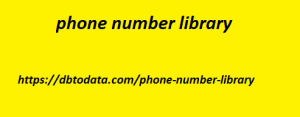One of the most effective ways to avoid echo chambers and groupthink is by actively encouraging diverse viewpoints. When everyone in a community shares the same opinion or outlook, conversations become repetitive and stagnant. To counteract this, invite members to share their experiences and ideas, particularly those who might have different backgrounds, expertise, or viewpoints. For instance, ask open-ended questions like, “How does this issue look from your perspective, especially if you come from a different industry or culture?” Encouraging diversity in contributions not only enriches the discussion but also opens up new ways of thinking that might not have been considered by the group.
Challenge Ideas Constructively
Healthy debate is a cornerstone of intellectual growth, and challenging ideas in a respectful manner helps prevent groupthink. When you nepal phone number library encounter a viewpoint you don’t fully agree with, instead of immediately echoing the dominant opinion or avoiding the discussion, engage with it thoughtfully. For example, you might say, “I understand your point, but I see it differently because…”. By offering counterpoints or presenting alternative perspectives, you invite critical thinking and ensure the conversation doesn’t become an echo chamber. Just be sure to do so in a way that is respectful and promotes constructive dialogue, rather than turning it into an argument.
Ask Thought-Provoking Questions
Rather than relying on others to reinforce your existing beliefs, ask questions that push people to think critically and expand the conversation. Thought-provoking questions stimulate deeper analysis and encourage members to reflect on their ideas more thoroughly. Questions like, “What evidence or examples can support this?” or “Are there any potential downsides to this approach?” invite others to consider different angles and challenge assumptions. This keeps the discussion fresh and prevents it from becoming a monotonous cycle of repetitive affirmations. Thought-provoking questions also create opportunities for others to bring in insights they might not have initially shared, which contributes to more meaningful conversations.
Respect Different Opinions and Encourage Civil Discourse
In any community, disagreements are bound to occur, but it’s important to create an environment where differing opinions can be expressed and debated without hostility. When people feel their views are welcomed—even if they’re in the minority—they are more likely to participate and offer unique perspectives. Be respectful when encountering opinions that differ from your own and avoid dismissing others outright. Phrases like, “I see where you’re coming from, but have you considered…?” or “That’s an interesting perspective. Here’s how I think about it…” show that you respect others’ ideas and are open to constructive debate. Encouraging this kind of civil discourse keeps the community open to diverse views and avoids the narrowing effects of groupthink.
5. Avoid Over-Simplified Consensus
While it’s important to reach consensus on certain issues, an overly simplified agreement that glosses over complexities can lead to groupthink. Avoid the tendency to seek easy agreement or consensus without fully exploring the various dimensions of a topic. Groupthink often thrives when members of a community agree too quickly without questioning underlying assumptions or examining potential risks. To prevent this, take the time to explore all aspects of an issue, ask members for their reasons behind their opinions, and encourage others to express doubts or alternative views. This deeper engagement fosters critical thinking and ensures that consensus is reached based on thorough consideration, not just convenience.
6. Highlight and Value Contrasting Opinions
Sometimes, individuals with differing opinions shy away from speaking up because they fear conflict or rejection. It’s important to value and highlight contrasting viewpoints within the discussion. When someone shares a perspective that differs from the mainstream opinion, acknowledge it and show appreciation for the diversity it brings to the conversation. For example, “I appreciate that point of view—it’s different from what we’ve discussed, but it brings up important considerations.” By highlighting contrasting opinions in a positive light, you encourage others to express their own unique thoughts, creating a more balanced and nuanced discussion. This also helps prevent the group from falling into an echo chamber where only one narrative is allowed to dominate.
7. Encourage Critical Thinking and Evidence-Based Discussion
Fostering an environment of critical thinking is one of the best ways to avoid groupthink. Encourage members to back up their what we can learn from the demise of other companies arguments with evidence, data, or examples. This shifts the focus from opinions to informed perspectives and helps ground discussions in reality. For instance, if someone presents an argument, ask, “What evidence or case studies can you share to support that?” or “How does this approach work in practice?” By making evidence and reasoning a key part of the conversation, you prevent the group from simply accepting ideas without scrutiny. This approach challenges assumptions and keeps the discussion rooted in logic, analysis, and open-mindedness.
8. Monitor for Bias and Unconscious Influence
Sometimes groupthink occurs without anyone realizing it. Social dynamics, unconscious biases, and peer pressure can subtly influence atb directory members to conform to a prevailing opinion. To avoid this, encourage self-awareness and mindfulness within the community. For example, you can occasionally remind the group to consider their own biases or highlight situations where the group may be leaning too heavily toward one view without considering others. This helps members stay conscious of the tendency to conform and encourages them to critically examine their beliefs and opinions. Promoting a culture where everyone feels free to think independently reduces the risk of groupthink and keeps the conversation inclusive.


